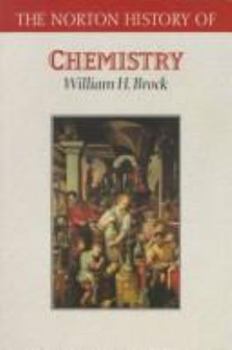The Norton History of Chemistry
Select Format
Select Condition 
Book Overview
Recounts the rise of a sophisticated science, from the alchemists' futile attempts to turn lead into gold, to the breakthroughs of the 20th century.
Format:Paperback
Language:English
ISBN:0393310434
ISBN13:9780393310436
Release Date:January 1993
Publisher:W. W. Norton & Company
Length:744 Pages
Weight:1.95 lbs.
Dimensions:1.4" x 5.5" x 8.2"
Customer Reviews
4 ratings
Should be called "History of Chemical Theory"
Published by Thriftbooks.com User , 23 years ago
I can envision three types of history when someone says "History of Chemistry" - 1. tales of the chemists themselves, including ancestory, childhood, education, etc. 2. tales of the experiments they perform and 3. a history of the theories to explain the experiments. This particular book is heavily weighted on the third of these options, and thus, I would have titled this book "History [or Development] of Chemical Theory".Having narrowed down the scope of what is covered leaves more space to focus on the theory aspects, and it is done very well, especially in the post-Lavoisier era. As mentioned in another review, the Alchemical and Phlogiston theories are much less well developed, which is disappointing. I would also have liked to see more archeological information - a brief discussion of metallurgy in Rome or gunpowder in China would have been interesting, if not particularly scientific.Finally, although the preface states that anyone with a high school knowledge of science should be able to follow the book, in practice I think that non-chemists (i.e. someone without 2 or 3 university courses) would find it to be heavy slogging.
Well researched, broad coverage of practice and theory
Published by Thriftbooks.com User , 24 years ago
I've only giving this 4 stars because the early part of the book is a little disappointing. The coverage of alchemy is sketchy and the pneumatic chemists are given short shrift. You feel that Brock didn't really have his heart in the pre-Lavoisier history.By contrast, the treatment of nineteenth century chemistry is suberb, giving broad and balanced coverage of laboratory practice, industry and theoretical developments. The text conveys a real sense of excitement as the discoveries unfold; Brock does an excellent job of organising a wealth of technical detail clearly.There is also a good coverage of early twentieth century chemistry, about up to the point where quantum mechanics took hold.Overall, highly recommended. But you definitely need a background in chemistry to get the most out of it.
A captivating book
Published by Thriftbooks.com User , 24 years ago
I was captivated by this book. The book was thoroughly researched and documented, and provided useful insight to the motives behind historical developments.To enjoy the book, you really need to have a background in chemistry as well as a general knowledge of major historical developments. At times, the book had a disjointed approach, referencing historical individuals long before introducing them. Additionally, I would have preferred a greater focus on the impact of the historical developments on current practice.Overall, an fascinating and worthwhile endeavor.
Thorough, Comprehensible History of Chemistry
Published by Thriftbooks.com User , 25 years ago
This is an incredibly long and dense book, but well worth the time and effort to read it. It begins with alchemistry and early chemistry, and ends with modern chemistry circa the mid-twentieth century. The most recent discoveries and work are therefore not included in this work.One of the most interesting things that I learned was that alchemists believed that minerals, like animals, had a "perfect form" to which they were aspiring to reach. They believed that this form was gold. Thus, for them alchemy was more than just an attempt to enrich themselves; it was a spiritual and religious undertaking as well.The majority of the book deals with modern chemistry, and there are some interesting sections about the Ingold-Robinson feud, environmental chemistry, and the rise of the great chemical companies. One of the biggest downsides of the book was that it was almost entirely a history of Western (with a special focus on European) chemistry, although there was also discussion of American and Australian chemistry. There is so much information here that it is impossible to read this book in large chunks if you want to be able to absorb any of it. Some parts may also be difficult to follow for people without some previous training in chemical theory. Overall, I would recommend it to anyone interested in chemistry, especially chemists who would like to know the ancient and venerable history of their own field.






